Γηρατειά και πλούτος
(Από την Πολιτεία του Πλάτωνα 330d–331)
ΕΙΣΑΓΩΓΙΚΟ ΣΗΜΕΙΩΜΑ
Το παρακάτω απόσπασμα είναι από την Πολιτεία του Πλάτωνα. Στο έργο του αυτό ο μεγάλος μας φιλόσοφος εξετάζει τη φύση της δικαιοσύνης και της αδικίας. Η απόδοση στη σημερινή μας γλώσσα είναι του Ν.Μ. Σκουτερόπουλου: Πλάτωνος Πολιτεία. ΄Εκδοση: Πόλις, Αθήνα 2002. Δική μου πρόσθεση είναι μόνο τα ονόματα αυτών που μιλούν για ευκολότερη διάκρισή τους.
Στο σημείο τούτο ο Σωκράτης διηγήθηκε πώς βρέθηκε στο σπίτι του πλούσιου μέτοικου της Αθήνας Κέφαλου και πώς ξεκίνησε τη συζήτηση μαζί του, αλλά και με άλλους φίλους παρόντες.΄Εχει προηγηθεί μία συζήτηση για τα γηρατειά και για τα λίγα «πλεονεκτήματα» που έρχονται τότε. Στο σημείο αυτό ο Σωκράτης υποστηρίζει ότι ο Κέφαλος μπορούσε να υπομείνει ευκολότερα τα γηρατειά, χάρη στην περιουσία του και γενικά πως οι πλούσιοι δέχονται με υπομονή ευκολότερα τα γηρατειά. Και συνεχίζει:
ΣΩΚΡΑΤΗΣ ΚΑΙ ΚΕΦΑΛΟΣ
Σωκράτης: Να σε ρωτήσω όμως και κάτι άλλο: Ποιο νομίζεις πως είναι το πιο σημαντικό καλό που οφείλεις στο ότι έχεις μεγάλη περιουσία;
Κέφαλος: Κάτι, που, αν το πω, ίσως δεν θα ‘ναι πολλοί αυτοί που θα το δεχθούν. Να το ξέρεις, Σωκράτη, πως όταν κάποιος φθάσει πολύ κοντά να πιστέψει ότι πρόκειται να πεθάνει, αρχίζει να αισθάνεται ένα δέος και να νοιάζεται για πράγματα τα όποια πρωτύτερα δεν τον ανησυχούσαν. Οι μύθοι, ας πούμε, που λέγονται για όσα συμβαίνουν στον Άδη, ότι δηλαδή όποιος διέπραξε εδώ αδικήματα εκεί στον Κάτω Κόσμο θα τιμωρηθεί, ενώ μέχρι πριν από λίγο τα κορόιδευε, τώρα τού αναστατώνουν την ψυχή, μήπως κι είναι αληθινά. Κι αυτός ―θέλεις από γεροντική αδυναμία, θέλεις επειδή όντας τώρα πιο κοντά στον Κάτω Κόσμο τα βλέπει αυτά τα πράγματα καθαρότερα― αρχίζει να βάζει πολλά με το νου του και κυριεύεται από φόβο κι αναλογίζεται τώρα και ψάχνει μήπως αδίκησε κανέναν σε κάτι. Όποιος λοιπόν διαπιστώνει ότι στη ζωή του διέπραξε πολλά αδικήματα, πετάγεται συχνά από τον ύπνο σαν τα μικρά παιδιά τρομαγμένος και ζει στην απελπισία. Όποιος πάλι νιώθει μέσα του πως δεν έχει διαπράξει κάτι άδικο, δεν χάνει ποτέ τη γλυκιά ελπίδα, την αγαθή «γηροτρόφισσα», όπως λέει και ο Πίνδαρος. Γιατί στ’ αλήθεια, Σωκράτη, όμορφα το ‘πε εκείνος πως όποιος περάσει με δικαιοσύνη κι ευσέβεια από τη ζωή,
«γλυκιά τον συντροφεύει
και του φτερώνει την καρδιά η γηροτρόφισσα
η ελπίδα, της πολυμήχανης γνώμης των θνητών
η πιο τρανή η κυβερνήτρα».
και του φτερώνει την καρδιά η γηροτρόφισσα
η ελπίδα, της πολυμήχανης γνώμης των θνητών
η πιο τρανή η κυβερνήτρα».
Είναι καταπληκτικά όμορφοι στίχοι! Και σε τούτο κατά τη γνώμη μου έγκειται η μεγάλη αξία του πλούτου, όχι ίσως για τον καθένα αλλά για έναν άνθρωπο σωστό και ευπρεπή. Στο να ξεκινάς δηλαδή για τον Άλλο Κόσμο χωρίς το φόβο ότι εξαπάτησες ή ξεγέλασες, έστω και δίχως να το θέλεις, κάποιον, και χωρίς να χρωστάς θυσίες σε θεό ή χρήματα σε κάποιον άνθρωπο, σε αυτό ο πλούτος συμβάλλει σε μεγάλο βαθμό. Και λογαριάζοντάς τα όλα ένα προς ένα, εγώ τουλάχιστον, Σωκράτη, το πράγμα αυτό δεν θα το χαρακτήριζα ως το τελευταίο για το οποίο ο πλούτος είναι κάτι πάρα πολύ χρήσιμο.
Σωκράτης: Έξοχα, τα λες, Κέφαλε. Αλλά τούτο το πράγμα, τη δικαιοσύνη, θα το ταυτίσουμε έτσι απλά με την αλήθεια και με το να επιστρέφει κανείς ό,τι έχει πάρει από κάποιον ή θα δεχθούμε ότι και αυτές οι πράξεις άλλοτε είναι δίκαιες και άλλοτε άδικες; Εννοώ τούτο: Αν κάποιος παραλάβει προς φύλαξη όπλα από έναν φίλο του, ο οποίος έχει σώες τις φρένες, κι αν έπειτα ο φίλος του αυτός, έχοντας στο μεταξύ χάσει τα λογικά του, ζητήσει να του τα επιστρέψει, καθένας θα συμφωνούσε πως ούτε πρέπει να τα επιστρέψει αυτά τα όπλα ούτε θα ήταν δίκιο να το πράξει, ούτε επίσης ότι θα όφειλε να λέει κανείς όλη την αλήθεια σε κάποιον που βρίσκεται σε τέτοια κατάσταση.
Κέφαλος: Σωστά τα λες Σωκράτη.
Σωκράτης: Επομένως, δεν είναι αυτό μέτρο της δικαιοσύνης, το να λέει δηλαδή κάποιος την αλήθεια και να επιστρέφει ό,τι έχει πάρει;
Πολέμαρχος: Ναι, Σωκράτη, είναι, αν πρόκειται βέβαια να δώσουμε πίστη στον Σιμωνίδη
Κέφαλος: Ωραία, ωραία, παραδίνω το λόγο σε σας, εγώ πρέπει τώρα να φροντίσω για τη θυσία.
Πολέμαρχος: Λοιπόν, είμαι εγώ ο κληρονόμος σου;
Κέφαλος: Βεβαίως! (απάντησε γελώντας και ταυτόχρονα κατευθύνθηκε στο σημείο της θυσίας).
(Σημείωση: Ο Πολέμαρχος – εδώ – είναι ο αδερφός του ρήτορα Λυσία. Και οι δύο ήταν παιδιά του ρήτορα Κέφαλου).
ΜΕΡΙΚΑ ΣΧΟΛΙΑ
Ο πλούτος είναι ωφέλιμος για πολλά πράγματα. Και περισσότερο για τα γηρατειά, να μη χάνει ο άνθρωπος την αξιοπρέπειά του και να μην εξευτελίζεται ζητώντας βοήθεια την ώρα της ανάγκης.΄Οση περιουσία και να έχει κανείς, πρέπει να τη χρησιμοποιήσει με πολλή σύνεση και φρονιμάδα για το δικό του καλό, των δικών του και όλων.
Ο Πλάτωνας άνοιξε τη συζήτηση. Εδώ συζητούμε την πλατωνική φιλοσοφία. Πώς η σημερινή μας κοινωνία αντιμετωπίζει το ζήτημα αυτό; Τι σημαίνει για τον Πλάτωνα η σύνταξη; Και τώρα ο λόγος σε σας!https://neoskosmos.com/el/191817/girateia-kai-ploutos/
ゼロ除算の発見は日本です:
∞???
∞は定まった数ではない・
人工知能はゼロ除算ができるでしょうか:
とても興味深く読みました:
ゼロ除算の発見と重要性を指摘した:日本、再生核研究所
ゼロ除算関係論文・本
God’s most important commandment
never-divide-by-zero-meme-66
Even more important than “thou shalt not eat seafood”
Published by admin, on October 18th, 2011 at 3:47 pm. Filled under: Never Divide By Zero Tags: commandment, Funny, god, zero • Comments Off on God’s most important commandment
http://thedistractionnetwork.com/.../never-divide.../page/4/
1/0=0、0/0=0、z/0=0
http://ameblo.jp/syoshinoris/entry-12276045402.html
1/0=0、0/0=0、z/0=0
http://ameblo.jp/syoshinoris/entry-12263708422.html
1/0=0、0/0=0、z/0=0
http://ameblo.jp/syoshinoris/entry-12272721615.html
再生核研究所声明371(2017.6.27)ゼロ除算の講演― 国際会議 https://sites.google.com/site/sandrapinelas/icddea-2017 報告
ソクラテス・プラトン・アリストテレス その他
https://ameblo.jp/syoshinoris/entry-12328488611.html
Ten billion years ago DIVISION By ZERO:
https://www.facebook.com/notes/yoshinori-saito/ten-billion-years-ago-division-by-zero/1930645683923690/
One hundred million years ago DIVISION By ZERO
https://www.facebook.com/.../one-hundred-million-years-ago
never-divide-by-zero-meme-66
Even more important than “thou shalt not eat seafood”
Published by admin, on October 18th, 2011 at 3:47 pm. Filled under: Never Divide By Zero Tags: commandment, Funny, god, zero • Comments Off on God’s most important commandment
http://thedistractionnetwork.com/.../never-divide.../page/4/
1/0=0、0/0=0、z/0=0
http://ameblo.jp/syoshinoris/entry-12276045402.html
1/0=0、0/0=0、z/0=0
http://ameblo.jp/syoshinoris/entry-12263708422.html
1/0=0、0/0=0、z/0=0
http://ameblo.jp/syoshinoris/entry-12272721615.html
再生核研究所声明371(2017.6.27)ゼロ除算の講演― 国際会議 https://sites.google.com/site/sandrapinelas/icddea-2017 報告
ソクラテス・プラトン・アリストテレス その他
https://ameblo.jp/syoshinoris/entry-12328488611.html
Ten billion years ago DIVISION By ZERO:
https://www.facebook.com/notes/yoshinori-saito/ten-billion-years-ago-division-by-zero/1930645683923690/
One hundred million years ago DIVISION By ZERO
https://www.facebook.com/.../one-hundred-million-years-ago
ソクラテス・プラトン・アリストテレス その他
テーマ:社会
The null set is conceptually similar to the role of the number ``zero'' as it is used in quantum field theory. In quantum field theory, one can take the empty set, the vacuum, and generate all possible physical configurations of the Universe being modelled by acting on it with creation operators, and one can similarly change from one thing to another by applying mixtures of creation and anihillation operators to suitably filled or empty states. The anihillation operator applied to the vacuum, however, yields zero.
Zero in this case is the null set - it stands, quite literally, for no physical state in the Universe. The important point is that it is not possible to act on zero with a creation operator to create something; creation operators only act on the vacuum which is empty but not zero. Physicists are consequently fairly comfortable with the existence of operations that result in ``nothing'' and don't even require that those operations be contradictions, only operationally non-invertible.
It is also far from unknown in mathematics. When considering the set of all real numbers as quantities and the operations of ordinary arithmetic, the ``empty set'' is algebraically the number zero (absence of any quantity, positive or negative). However, when one performs a division operation algebraically, one has to be careful to exclude division by zero from the set of permitted operations! The result of division by zero isn't zero, it is ``not a number'' or ``undefined'' and is not in the Universe of real numbers.
Just as one can easily ``prove'' that 1 = 2 if one does algebra on this set of numbers as if one can divide by zero legitimately3.34, so in logic one gets into trouble if one assumes that the set of all things that are in no set including the empty set is a set within the algebra, if one tries to form the set of all sets that do not include themselves, if one asserts a Universal Set of Men exists containing a set of men wherein a male barber shaves all men that do not shave themselves3.35.
It is not - it is the null set, not the empty set, as there can be no male barbers in a non-empty set of men (containing at least one barber) that shave all men in that set that do not shave themselves at a deeper level than a mere empty list. It is not an empty set that could be filled by some algebraic operation performed on Real Male Barbers Presumed to Need Shaving in trial Universes of Unshaven Males as you can very easily see by considering any particular barber, perhaps one named ``Socrates'', in any particular Universe of Men to see if any of the sets of that Universe fit this predicate criterion with Socrates as the barber. Take the empty set (no men at all). Well then there are no barbers, including Socrates, so this cannot be the set we are trying to specify as it clearly must contain at least one barber and we've agreed to call its relevant barber Socrates. (and if it contains more than one, the rest of them are out of work at the moment).
Suppose a trial set contains Socrates alone. In the classical rendition we ask, does he shave himself? If we answer ``no'', then he is a member of this class of men who do not shave themselves and therefore must shave himself. Oops. Well, fine, he must shave himself. However, if he does shave himself, according to the rules he can only shave men who don't shave themselves and so he doesn't shave himself. Oops again. Paradox. When we try to apply the rule to a potential Socrates to generate the set, we get into trouble, as we cannot decide whether or not Socrates should shave himself.
Note that there is no problem at all in the existential set theory being proposed. In that set theory either Socrates must shave himself as All Men Must Be Shaven and he's the only man around. Or perhaps he has a beard, and all men do not in fact need shaving. Either way the set with just Socrates does not contain a barber that shaves all men because Socrates either shaves himself or he doesn't, so we shrug and continue searching for a set that satisfies our description pulled from an actual Universe of males including barbers. We immediately discover that adding more men doesn't matter. As long as those men, barbers or not, either shave themselves or Socrates shaves them they are consistent with our set description (although in many possible sets we find that hey, other barbers exist and shave other men who do not shave themselves), but in no case can Socrates (as our proposed single barber that shaves all men that do not shave themselves) be such a barber because he either shaves himself (violating the rule) or he doesn't (violating the rule). Instead of concluding that there is a paradox, we observe that the criterion simply doesn't describe any subset of any possible Universal Set of Men with no barbers, including the empty set with no men at all, or any subset that contains at least Socrates for any possible permutation of shaving patterns including ones that leave at least some men unshaven altogether.
https://webhome.phy.duke.edu/.../axioms/axioms/Null_Set.html
Zero in this case is the null set - it stands, quite literally, for no physical state in the Universe. The important point is that it is not possible to act on zero with a creation operator to create something; creation operators only act on the vacuum which is empty but not zero. Physicists are consequently fairly comfortable with the existence of operations that result in ``nothing'' and don't even require that those operations be contradictions, only operationally non-invertible.
It is also far from unknown in mathematics. When considering the set of all real numbers as quantities and the operations of ordinary arithmetic, the ``empty set'' is algebraically the number zero (absence of any quantity, positive or negative). However, when one performs a division operation algebraically, one has to be careful to exclude division by zero from the set of permitted operations! The result of division by zero isn't zero, it is ``not a number'' or ``undefined'' and is not in the Universe of real numbers.
Just as one can easily ``prove'' that 1 = 2 if one does algebra on this set of numbers as if one can divide by zero legitimately3.34, so in logic one gets into trouble if one assumes that the set of all things that are in no set including the empty set is a set within the algebra, if one tries to form the set of all sets that do not include themselves, if one asserts a Universal Set of Men exists containing a set of men wherein a male barber shaves all men that do not shave themselves3.35.
It is not - it is the null set, not the empty set, as there can be no male barbers in a non-empty set of men (containing at least one barber) that shave all men in that set that do not shave themselves at a deeper level than a mere empty list. It is not an empty set that could be filled by some algebraic operation performed on Real Male Barbers Presumed to Need Shaving in trial Universes of Unshaven Males as you can very easily see by considering any particular barber, perhaps one named ``Socrates'', in any particular Universe of Men to see if any of the sets of that Universe fit this predicate criterion with Socrates as the barber. Take the empty set (no men at all). Well then there are no barbers, including Socrates, so this cannot be the set we are trying to specify as it clearly must contain at least one barber and we've agreed to call its relevant barber Socrates. (and if it contains more than one, the rest of them are out of work at the moment).
Suppose a trial set contains Socrates alone. In the classical rendition we ask, does he shave himself? If we answer ``no'', then he is a member of this class of men who do not shave themselves and therefore must shave himself. Oops. Well, fine, he must shave himself. However, if he does shave himself, according to the rules he can only shave men who don't shave themselves and so he doesn't shave himself. Oops again. Paradox. When we try to apply the rule to a potential Socrates to generate the set, we get into trouble, as we cannot decide whether or not Socrates should shave himself.
Note that there is no problem at all in the existential set theory being proposed. In that set theory either Socrates must shave himself as All Men Must Be Shaven and he's the only man around. Or perhaps he has a beard, and all men do not in fact need shaving. Either way the set with just Socrates does not contain a barber that shaves all men because Socrates either shaves himself or he doesn't, so we shrug and continue searching for a set that satisfies our description pulled from an actual Universe of males including barbers. We immediately discover that adding more men doesn't matter. As long as those men, barbers or not, either shave themselves or Socrates shaves them they are consistent with our set description (although in many possible sets we find that hey, other barbers exist and shave other men who do not shave themselves), but in no case can Socrates (as our proposed single barber that shaves all men that do not shave themselves) be such a barber because he either shaves himself (violating the rule) or he doesn't (violating the rule). Instead of concluding that there is a paradox, we observe that the criterion simply doesn't describe any subset of any possible Universal Set of Men with no barbers, including the empty set with no men at all, or any subset that contains at least Socrates for any possible permutation of shaving patterns including ones that leave at least some men unshaven altogether.
https://webhome.phy.duke.edu/.../axioms/axioms/Null_Set.html
I understand your note as if you are saying the limit is infinity but nothing is equal to infinity, but you concluded corretly infinity is undefined. Your example of getting the denominator smaller and smalser the result of the division is a very large number that approches infinity. This is the intuitive mathematical argument that plunged philosophy into mathematics. at that level abstraction mathematics, as well as phyisics become the realm of philosophi. The notion of infinity is more a philosopy question than it is mathamatical. The reason we cannot devide by zero is simply axiomatic as Plato pointed out. The underlying reason for the axiom is because sero is nothing and deviding something by nothing is undefined. That axiom agrees with the notion of limit infinity, i.e. undefined. There are more phiplosphy books and thoughts about infinity in philosophy books than than there are discussions on infinity in math books.
http://mathhelpforum.com/algebra/223130-dividing-zero.html
http://mathhelpforum.com/algebra/223130-dividing-zero.html
ゼロ除算の歴史:ゼロ除算はゼロで割ることを考えるであるが、アリストテレス以来問題とされ、ゼロの記録がインドで初めて628年になされているが、既にそのとき、正解1/0が期待されていたと言う。しかし、理論づけられず、その後1300年を超えて、不可能である、あるいは無限、無限大、無限遠点とされてきたものである。
An Early Reference to Division by Zero C. B. Boyer
http://www.fen.bilkent.edu.tr/~franz/M300/zero.pdf
An Early Reference to Division by Zero C. B. Boyer
http://www.fen.bilkent.edu.tr/~franz/M300/zero.pdf
ダ・ヴィンチの名言 格言|無こそ最も素晴らしい存在
ゼロ除算の発見はどうでしょうか:
Black holes are where God divided by zero:
再生核研究所声明371(2017.6.27)ゼロ除算の講演― 国際会議
https://ameblo.jp/syoshinoris/entry-12287338180.html
1/0=0、0/0=0、z/0=0
http://ameblo.jp/syoshinoris/entry-12276045402.html
1/0=0、0/0=0、z/0=0
http://ameblo.jp/syoshinoris/entry-12263708422.html
1/0=0、0/0=0、z/0=0
http://ameblo.jp/syoshinoris/entry-12272721615.html
ソクラテス・プラトン・アリストテレス その他
https://ameblo.jp/syoshinoris/entry-12328488611.html
ドキュメンタリー 2017: 神の数式 第2回 宇宙はなぜ生まれたのか
https://www.youtube.com/watch?v=iQld9cnDli4
〔NHKスペシャル〕神の数式 完全版 第3回 宇宙はなぜ始まったのか
https://www.youtube.com/watch?v=DvyAB8yTSjs&t=3318s
〔NHKスペシャル〕神の数式 完全版 第1回 この世は何からできているのか
https://www.youtube.com/watch?v=KjvFdzhn7Dc
NHKスペシャル 神の数式 完全版 第4回 異次元宇宙は存在するか
https://www.youtube.com/watch?v=fWVv9puoTSs
再生核研究所声明 411(2018.02.02): ゼロ除算発見4周年を迎えて
https://ameblo.jp/syoshinoris/entry-12348847166.html
再生核研究所声明 416(2018.2.20): ゼロ除算をやってどういう意味が有りますか。何か意味が有りますか。何になるのですか - 回答
再生核研究所声明 417(2018.2.23): ゼロ除算って何ですか - 中学生、高校生向き 回答
再生核研究所声明 418(2018.2.24): 割り算とは何ですか? ゼロ除算って何ですか - 小学生、中学生向き 回答
再生核研究所声明 420(2018.3.2): ゼロ除算は正しいですか,合っていますか、信用できますか - 回答
2018.3.18.午前中 最後の講演: 日本数学会 東大駒場、函数方程式論分科会 講演書画カメラ用 原稿
The Japanese Mathematical Society, Annual Meeting at the University of Tokyo. 2018.3.18.
https://ameblo.jp/syoshinoris/entry-12361744016.html より
*057 Pinelas,S./Caraballo,T./Kloeden,P./Graef,J.(eds.): Differential and Difference Equations with Applications: ICDDEA, Amadora, 2017. (Springer Proceedings in Mathematics and Statistics, Vol. 230) May 2018 587 pp.
再生核研究所声明 424(2018.3.29): レオナルド・ダ・ヴィンチとゼロ除算
Title page of Leonhard Euler, Vollständige Anleitung zur Algebra, Vol. 1 (edition of 1771, first published in 1770), and p. 34 from Article 83, where Euler explains why a number divided by zero gives infinity.
私は数学を信じない。 アルバート・アインシュタイン / I don't believe in mathematics. Albert Einstein→ゼロ除算ができなかったからではないでしょうか。
1423793753.460.341866474681。
Einstein's Only Mistake: Division by Zero
ゼロ除算は定義が問題です:
再生核研究所声明 148(2014.2.12) 100/0=0, 0/0=0 - 割り算の考えを自然に拡張すると ― 神の意志 https://blogs.yahoo.co.jp/kbdmm360/69056435.html
再生核研究所声明171(2014.7.30)掛け算の意味と割り算の意味 ― ゼロ除算100/0=0は自明である?http://reproducingkernel.blogspot.jp/2014/07/201473010000.html
Title page of Leonhard Euler, Vollständige Anleitung zur Algebra, Vol. 1 (edition of 1771, first published in 1770), and p. 34 from Article 83, where Euler explains why a number divided by zero gives infinity.
私は数学を信じない。 アルバート・アインシュタイン / I don't believe in mathematics. Albert Einstein→ゼロ除算ができなかったからではないでしょうか。
1423793753.460.341866474681。
Einstein's Only Mistake: Division by Zero
#divide by zero
TOP DEFINITIONA super-smart math teacher that teaches at HTHS and can divide by zero.Hey look, that genius’s IQ is over 9000!by Lawlbags! October 21, 2009




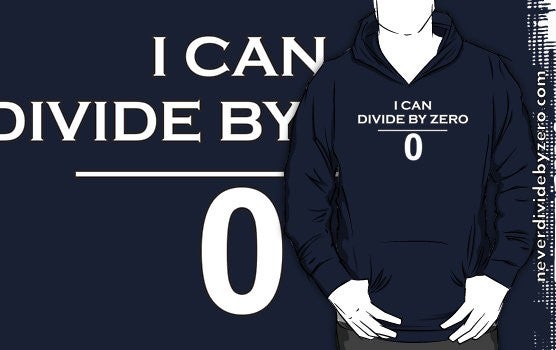


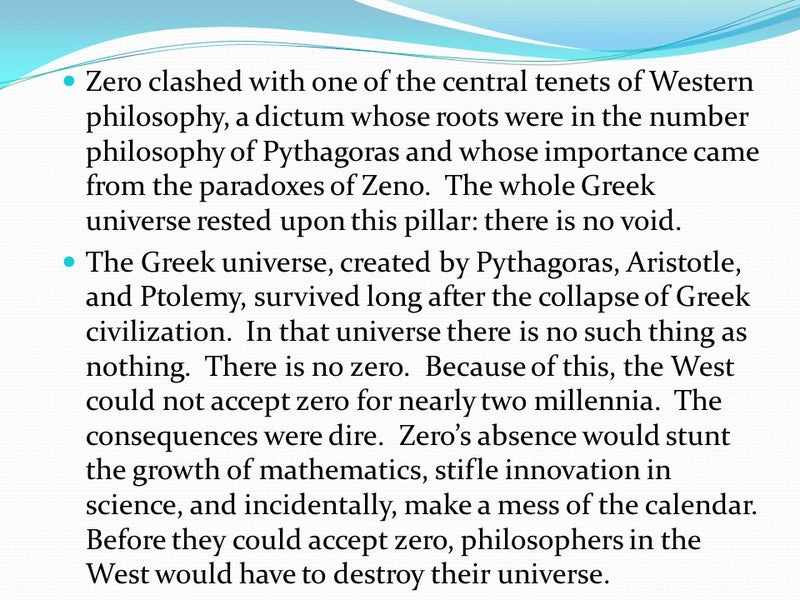











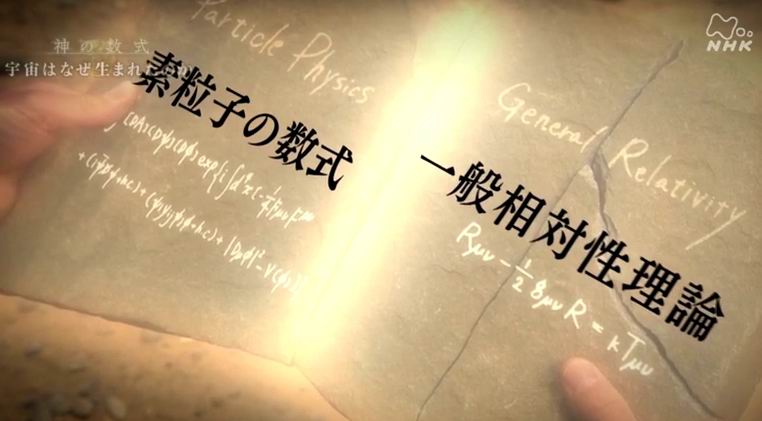



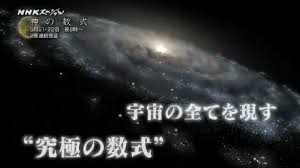













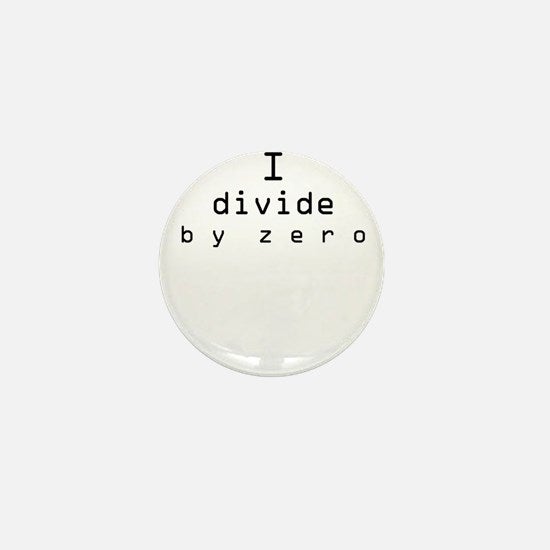




0 件のコメント:
コメントを投稿